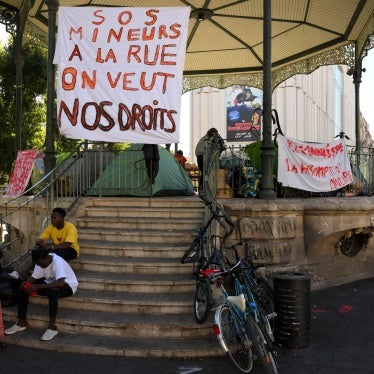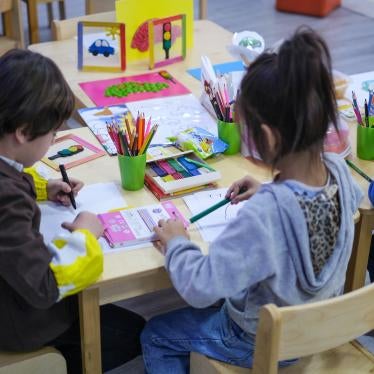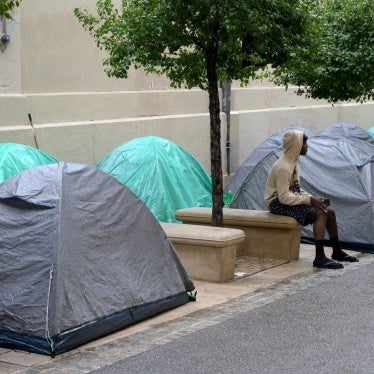In a March 28 letter to President Shevardnadze, Human Rights Watch expressed concernabout a pattern of attacks on adherents of non-Orthodox faiths that took place in the month following the February 22 Supreme Court ruling upholding the deregistration of the Jehovah's Witnesses organization. Preliminary Human Rights Watch research has found both that the attacks have continued, and that law enforcement officials have taken no significant measures to prevent them or hold the perpetrators accountable.
In a March 28 letter to President Shevardnadze, Human Rights Watch expressed concern about a pattern of attacks on adherents of non-Orthodox faiths that took place in the month following the February 22 Supreme Court ruling upholding the deregistration of the Jehovah's Witnesses organization. I am attaching the letter for your convenience. Preliminary Human Rights Watch research has found both that the attacks have continued, and that law enforcement officials have taken no significant measures to prevent them or hold the perpetrators accountable. Information that you could provide about the investigation and prosecution of such attacks would yield a better understanding of what has been done to end impunity for them.
Human Rights Watch interviewed the victims of five incidents in which vigilantes violently disrupted Jehovah's Witnesses prayer gatherings. In nearly every case, the perpetrators planned the attacks in advance, forcibly entered the private homes in which the prayer gatherings were held, physically assaulted those gathered, and destroyed property; in no case, to our knowledge, did police question the victims with a view to identifying the perpetrators:
• On February 27, at about 3:00 p.m., a group led by Basili Mkhalavishvili broke up a large prayer gathering in a private home in the Isani district of Tbilisi. While police were present at the scene, according to one eyewitness they not only did nothing to deter or stop the attack, but in fact abetted it by forcing open the house gates for the attackers. The attackers beat Rudolph Mikirtumov, a Jehovah's Witness; he sustained multiple injuries to his face, which required his brief hospitalization. Mikirtumov told Human Rights Watch that instead of questioning him about the details of the attack, procuracy investigators said that neighbors had been complaining about the noise level from his home. They also reportedly stated that information about police having forced open the gate for the attackers was "unnecessary."
• On March 5, a group of about 150 people, which included four priests from a local parish, attacked a prayer gathering in the town of Sashkhere; the previous day, the priests reportedly warned Jehovah's Witnesses that the Patriarchate authorized them to break up all Jehovah's Witnesses prayer gatherings. According to Savle Gotsadze, an eyewitness, the attackers broke household items belonging to the Itchkitidze family, who hosted the prayer gathering, and burned religious literature. Gotsadze told Human Rights Watch that a forensic doctor examined him for injuries he sustained during the attack. While the chief of police expressed regret to Gotsadze and Itchkitidze about the incident, to our knowledge, no investigation is under way.
• On April 7, a group of about twenty people- led by Paata Bluashvili, of the Cross organization-broke up a prayer gathering, ransacking the apartment where the gathering was held, and beating those gathered and neighbors who came to their defense. The attackers burned seized religious literature in a bonfire. According to an eyewitness, Ardoteli Kviria, police accused the Jehovah's Witnesses of violating public order by meeting in a private home; according to our information no investigation into the attack is under way.
• In another incident in Rustavi, on April 29, Jehovah's Witnesses began to disperse after hearing threats shouted through the door. Neighbors then beat those who attempted to escape the home through the window and seized their religious literature, which they allegedly burned in the front yard. Ilya Eterishvili, one of those beaten, told Human Rights Watch that while police asked him to write a statement about the attack, no investigation followed.
• In a particularly vicious incident on April 30, a group wielding sticks spiked with nails broke up a prayer gathering in the Svanetisubani district of Tbilisi. The attackers broke windows, furniture and electrical equipment, and beat those gathered with the spiked sticks. As a result, three victims were hospitalized. Among them was Tamaz Nachkebia, who sustained multiple contusions and whose head injuries required five stitches. A Human Rights Watch representative saw the open wounds to Nachkebia's left hand, right arm, left foot, as well as the bruises to his right ribcage and left cheek. While police who arrived at the scene after the attack ended took statements from eyewitnesses, to our knowledge no one has been detained in relation to the assault.
Any information you could provide about steps taken to investigate the above incidents and to prosecute the perpetrators would be most appreciated. You may fax a reply to me at 1.212. 736.1300.
Thank you in advance for your kind cooperation.
Sincerely,
/s/
Holly Cartner
Executive Director
Europe and Central Asia division
cc:
Ombudsperson Nana Devdariani
Mary Robinson, U.N. High Commissioner for Human Rights
John Beyrle, Acting Ambassador-at-Large and Special Adviser to the Secretary for the Newly Independent States
Amb. Gerard Stoudmann, ODIHR, OSCE
Rep. Christopher Smith, Chair, U.S. Commission on Security and Cooperation In Europe
Senator Ben Nighthorse Campbell, Chair, U.S. Commission on Security and Cooperation in Europe
Lord Russell-Johnston, President, Parliamentary Assembly, Council of Europe
Mr. Egbert Ausems, Secretary, Monitoring Committee, Council of Europe
Mr. Lorne Craner, U.S. Assistant Secretary of State for Democracy, Human Rights and Labor
Mr. Elio Germano, Head of Delegation, European Commission in Georgia
Mr. Jean-Michel Lacombe, Head of the OSCE Mission to Georgia
Mr. Kenneth Yalowitz, U.S. Ambassador to Georgia
Ms. Deborah Barnes-Jones, Ambassador of the United Kingdom to Georgia
Mr.Tom Farr, Director, U.S. Office on International Religious Freedom
Mr. Steve McFarland, Executive Director, U.S. Commission on International Religious Freedom








